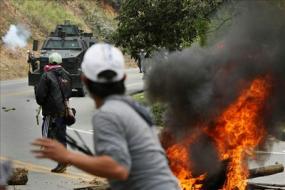P { margin-bottom: 0.21cm; }
On Thursday, October 17, the RCMP attacked a barricade set up by the Elsipogtog nation in New Brunswick. Since September 29, the participants had been blocking access to vehicles belonging to the company South Western Energy Resources (SNW, Texas), which has been carrying out exploration and seismic testing on Micmac territory in anticipation of producing shale gas there. Local residents have staged a series of actions against the company since last summer, resulting in several arrests. The RCMP assault on the barricade took place on the eve of a national day of action planned for October 18, just a few days after Columbus Day and its commemoration of the 521st anniversary of the beginning of the genocide against the Native peoples of the Americas. The police action touched off a wave of protest and solidarity around the country.
That same day, October 17, thousands of kilometres away in Colombia, the armed forces opened fire on a march led by a coalition known as the “Minga” for Social, Native, and People’s Justice. The march had begun three days earlier with over 120,000 people, in response to a call put out by the National Indigenous Organization of Colombia (ONIC) to condemn “the patent failure of the prevailing economic model, and the invasion of the ancestral land of indigenous peoples, farmers, and Afro-Colombians by mining, energy, and other megaprojects.” While the Colombian government talks of peace, the Native peoples of that country are the victims of attacks by its armed forces. Colombia’s civil society and human rights organizations have denounced the army’s use of non-conventional weapons and its involvement in torture and illegal detention. It should be recalled that the country’s coffee and potato growers, small-scale miners, and healthcare and education workers embarked on an organizing effort this year, culminating in a three-week farmers’ strike in September to show opposition to the recently signed free trade agreements and seed certification laws. As in Canada, the Native peoples of Colombia are fighting against what is known as an “extractivist” development model – one based on industrial-scale exploitation of mining and fossil fuel resources. The results of this model speak for themselves: ecosystem destruction, drinking water pollution, war, internal population displacement, and criminalization of those who resist.
In Québec, the opposition to such “extractive” projects – shale gas, the Malartic gold mine, resource exploitation on Anticosti Island and the Gaspé Peninsula, the Québec government’s northern development plan (Plan Nord), the reversal of Enbridge’s Line 9 – is intensifying. While governments and corporations invest in advertising and “social responsibility” to placate a concerned public, the track record of mining and petroleum companies around the world continues to give credence to what their most radical opponents are saying.
Opposition to such projects in Québec, though essential, is insufficient when one realizes that three-fourths of the world’s mining companies are registered in Canada, and when the extremes to which certain companies go to capture resources abroad, with the sole goal of raising their share price on the Toronto Stock Exchange, have become public knowledge. (These are in fact the cases that will be heard by the Permanent People's Tribunal when it convenes in 2014–2016 to examine Canada's mining policies around the world.) What is needed is a rethinking of this entire development model.
Blandine Juchs and Mélissa Leblanc - Projet accompagnement solidarité Colombie
